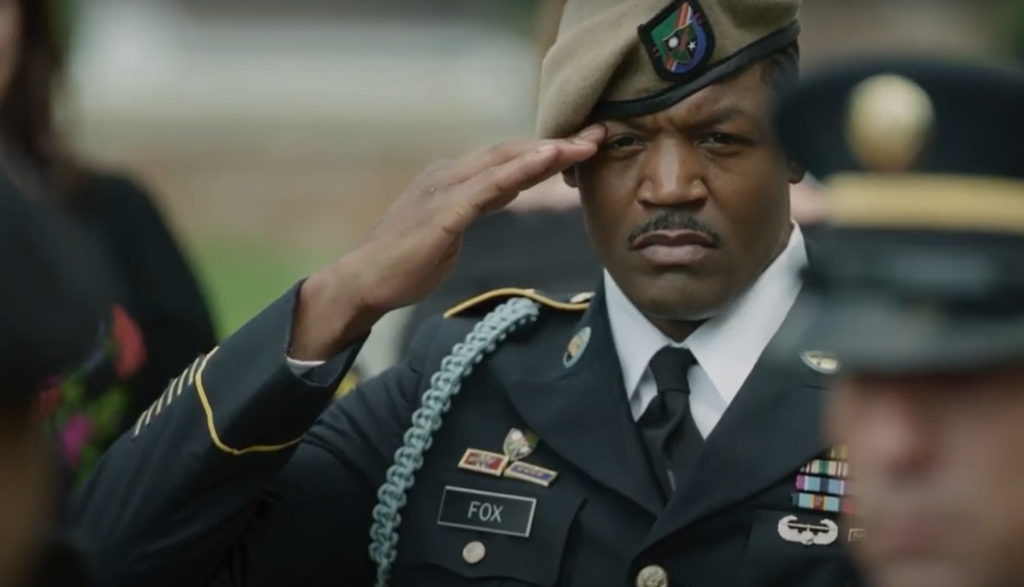
War veteran Travis Fox is a man of many troubles.
After returning home from his sixth combat deployment, Travis is struggling to acclimate to civilian life. He’s overcome by guilt for those he lost and tortured with PTSD, and he often thinks life would be better if he could just end it all.
But Travis has obligations at home that he can’t avoid, like deciding what to do with his parents’ home after their mysterious, fatal car crash. It’s an accident he can’t quite seem to get over. And one that is laced in hidden secrets that eventually force him to confront a trusted friend, face his inner demons and seek the God he’s heard about his entire life but never embraced.
Travis is emotionally closed off for much of the film. And for good reason: He has seen a lot of death, and he feels responsible as a Sgt. First Class for those in his command who’ve been killed. Slowly, he learns to slowly open up his heart and feelings; to forgive others and himself; and to seek healing.
We also see Travis trying to cope with his inner struggles in some concrete and outwardly focused ways. Travis helps to fix a facility to give homeless Army veterans a place to live, for instance.
Tiffany is a doctor and one who helps Travis in the film. Although a bit possessive and unaware of natural boundaries, she really tries to help Travis and give him advice. She also counsels former Army vets who struggle with PTSD and works tirelessly to find those who are homeless a place to live. Tiffany eventually convinces Travis that he, too, needs to seek medical care and wholeness.
We hear plenty of Scripture references throughout this film, including Micah 7:8, Isaiah 41:10, Psalm 55:22, 2 Timothy 2:1 and Jeremiah 29:11.
A pastor talks about many spiritual themes, including forgiveness, being a light in darkness and God’s grace, as well as His role as a healer, provider and deliverer. The pastor tells Travis that God turns tragedy into miracles and that Satan is at work every day trying to block us from what God has for us.
Travis wrestles with his own faith, saying often that he doesn’t believe God loves him, sees him or cares about him. Travis also says that he believes that the Bible is full of lies, as he’s never seen God’s promises fulfilled.
Travis constantly struggles as he remembers the words of his best friend and fallen soldier, Preach. Preach used to tell him that God loved and treasured him. Preach would tell him not to lose his life without having his soul ready. He would also tell Travis that his sins would cause his prayers to be rejected by God.
Travis acknowledges that although he’s not fully healed, he is seeking medical attention to heal his mind. Gradually, we see how he seeks God to heal his soul, too. Travis becomes more and more determined to find his way back to God as the story unfolds.
We hear that nothing is too big for God and that he will sustain us in our hardest times. We’re encouraged to seek God’s presence and to share our testimonies
Although there is a lot of encouragement, there’s also some problematic theology. The pastor tells Travis that the Bible says “he who believes and is baptized” will be saved, placing a big emphasis on the role of baptism as a necessary means to obtain salvation.
Travis works through many hard situations. Along that path, he meets some well-intended Christians who want to help him but mostly throw spiritual platitudes at him amid his sorrow—instead of truly being willing to walk with him and understand his burdens.
Travis says that war sounds like “the devil’s wedding reception.” He also talks about how religion can be distorted and used to promote violence.
Tiffany and Travis go on a few “dates” where they hold hands and hug. Tiffany wears a few cleavage-baring tops.
A ruthless man mentions Travis’ bravery, but in a crude way, saying that Travis has “a set on him.”
Travis struggles with severe post-traumatic stress disorder. He recounts many struggles and traumas, including watching his friends being shot and killed while at war.
We see the devastation of war not only on Travis’ psyche but also on families as they’re left without loved ones. A few times Travis contemplates suicide, holding a gun to his head and weeping. He also talks about the tragic car accident that led to his parents’ death.
Travis and his best friend, Donnie, are threatened by a drug lord who shoots and injures several people; Travis also threatens a few people. Donnie gets punched in the face by a drug lord’s bodyguard.
The news reports that two drug lords and their men were in a shoot-out. We hear gun shots but do not see any dead bodies.
The phrase “shut up” is heard twice.
We hear a reference to drug kingpins who rule nearby towns.
Travis struggles to trust people and to find hope throughout the film, saying he believes the only thing left for him is lies, betrayal and death. He contemplates suicide multiple times and blames himself for events outside of his control.
Police officers harass Travis, even after reassuring them he is fine. After he doesn’t comply, they Tase him and he’s put in jail overnight. The injustice is never addressed.
A drug dealer tells Travis that at some point everyone will pay him what he’s owed, “one way or the other.” Similar threats are made throughout the film.
It’s never too late to change. It’s never too late to reach out to others. And it’s never too late to seek God. Because when we seek Him, we find Him. This is what Travis learns.
My Brother’s Keeper follows one man on his faith journey as he pursues healing amidst constant tragedy. It’s a story that, I’m sure, many can relate to. Some who’ve experienced PTSD may find themselves identifying with Travis’ struggles in this area. Others may feel that the film oversimplifies this complex issue at times.
The film also makes strong theological statements, especially around the issue of baptism, that not all Christian audiences may see in exactly the same way. Other gritty issues parents should be aware of here—especially with regard to really young viewers—include references to violence, war casualties and referenced drug activity.
Still, the heart of My Brother’s Keeper beats loud and clear: God loves us all, even when our lives are touched by terrible tragedy.


Kristin Smith joined the Plugged In team in 2017. Formerly a Spanish and English teacher, Kristin loves reading literature and eating authentic Mexican tacos. She and her husband, Eddy, love raising their children Judah and Selah. Kristin also has a deep affection for coffee, music, her dog (Cali) and cat (Aslan).